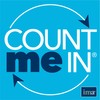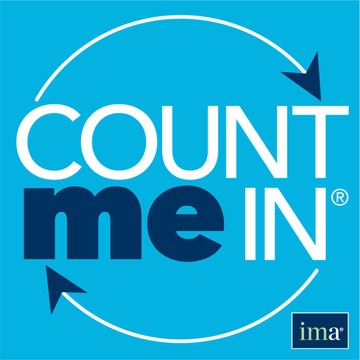

Count Me In®
IMA® (Institute of Management Accountants)
IMA® (Institute of Management Accountants) brings you the latest perspectives and learnings on all things affecting the accounting and finance world, as told by the experts working in the field and the thought leaders shaping the profession. Listen in to gain valuable insight and be included in the future of accounting and finance!
Episodes
Mentioned books

May 20, 2024 • 30min
Ep. 263: Howard Chang - Mastering the Comeback
Join us for a compelling episode of the Count Me In Podcast, where our host Adam Larson welcomes Howard Chang, CEO of Just Meeting Rooms and a beacon of resilience and entrepreneurial spirit. In this open-hearted discussion, Howard recounts his rollercoaster journey through personal and professional upheavals, including bankruptcy at 29 and overcoming cancer. Learn about Howard’s approach to redefining failure, leveraging lessons from sports for business success, and the pivotal role of resilience in his comeback story. We’ll explore how Howard transformed challenges into opportunities with innovative ventures like Just Meeting Rooms. His insights on managing risk, embracing imperfections, and the power of authenticity will inspire anyone navigating their own hurdles. Don’t miss this episode where wisdom and motivation meet real-life triumphs and trials.

May 13, 2024 • 24min
Ep. 262: Srinath Ganesan - Advancing AI: Ethical Considerations in Finance
Tune into this compelling episode of Count Me In with guest Srinath Ganesan, the Director of Finance & Risk Solutions at SAP. Srinath unpacks the transformative role of AI in finance, presenting it as both an enabler and a crucial tool for ethical considerations. With a wealth of experience, he brings practical insights, discussing how AI streamlines processes like financial reporting and influences investment decisions. Hosted by Adam Larson, this engaging discussion is perfect for finance professionals, and anyone interested in the ethical integration of technology in finance. Don't miss these expert insights to navigate the evolving intersection of AI and finance with confidence.

May 7, 2024 • 12min
BONUS | Embracing AI: Insights for International Management Accounting Day
Celebrate International Management Accounting Day with a special episode of the Count Me In Podcast, featuring an enlightening discussion between two esteemed guests: Travis Willard, Senior Vice President of Product and Innovation at IMA, and Susie Duong, Director of Research at IMA, bringing unique perspectives on the integration of AI into accounting and finance.As they exchange insights on how artificial intelligence is reshaping the landscape of talent retention and career development, listeners will uncover cutting-edge strategies to stay ahead in an ever-evolving field. This episode is a perfect salute to the day that honors the significance of management accounting, providing actionable intelligence for professionals eager to navigate an AI-driven business environment. Tune in for an engaging conversation that marks International Management Accounting Day with forward-thinking dialogue and expert analysis on the Count Me In Podcast.

May 6, 2024 • 26min
Ep. 261: Timothy Wingate - Streamlining Construction Accounting
In this captivating episode of the Count Me In Podcast, we sit down with Timothy Wingate, EA, the knowledgeable founder and president of G+F Business & Financial Consulting LLC. Wingate unravels the tangled web of communications within finance and back office teams, especially within the construction sector. He shares indispensable strategies for leveraging technology to improve these crucial interactions and ensures financial information remains both accessible and secure.Hear how real-time project management and meticulous bookkeeping are game-changers for cash flow and project success. Wingate, with his expertise, also discusses the art of building trust with clients, fostering an environment of truth and growth. Whether you’re navigating the financial underpinnings of your company or looking to streamline communication, this episode offers a treasure trove of insights for business professionals eager to drive their organizations forward.

Apr 29, 2024 • 26min
Ep. 260: Nicolas Kopp - Streamlining Operations for Success
If productivity puzzles have you stumped, tune in to an enlightening episode of the Count Me In Podcast with host Adam Larson and special guest, Nicolas Kopp, the entrepreneurial force behind Rillet. In this candid conversation, Nicolas unveils critical tips to streamline your workday, break free from the quagmire of meetings, and leverage cutting-edge tools to boost efficiency. Whether you're a business owner or a corporate team player, you'll discover strategies to cut through the clutter and optimize your operations. Nicolas's pragmatic approach, combined with actionable steps tailored for any work environment, will leave you equipped and enthused to transform your approach to productivity. Join us for a session brimming with insights from a tech leader's perspective, all here on Count Me In. Hit play and prepare for progress!

Apr 22, 2024 • 28min
Ep. 259: Nicolas Boucher - The Strategic Edge of AI in Finance
Explore the transformative power of AI in finance with Nicolas Boucher, founder of the AI Finance Club, in this captivating episode of the Count Me In Podcast. Host Adam Larson engages with Nicolas in a lively discussion on the integration of AI with financial practices, demonstrating how it simplifies processes and elevates efficiency.Nicolas sheds light on practical AI applications, from automating data analysis to revolutionizing customer interactions, and he stresses the importance of upskilling for the digital age. Plus, get a glimpse into the collaborative learning experience offered by the AI Finance Club.Perfect for finance professionals eager to embrace AI or those fascinated by the evolution of the sector, this episode is packed with actionable insights from a leading expert in the field. Tune in for a riveting conversation that will leave you inspired and ready for the AI era in finance.

8 snips
Apr 15, 2024 • 31min
Ep. 258: Chris Papin - Ethical Decision-Making
Join Adam Larson as he chats with Chris Papin, a trusted advisor with experience in legal and insurance sectors. They discuss ethical decision-making during uncertainty, managing COVID loans, importance of saying 'no' to clients, and the future role of human advisors in a tech-driven landscape.

Apr 8, 2024 • 32min
Ep. 257: Ellen Class and Janis Parthun - The Efficient Path to a One-Day Financial Close
In this exciting episode of Count Me In, host Adam Larson chats with two Vice Presidents at RGP, Ellen Class and Janis Parthun. RGP is a global consulting firm known for catalyzing swift business outcomes through transformative change. They share insider tips on transforming your financial close process from a marathon to a sprint and discuss the power of cutting-edge technology to streamline your operations.Ellen Class will captivate you with her first-hand experience on enhancing efficiency and revealing the aftereffects, such as boosting work-life balance. Then, Janis Parthun, a maestro of project execution, layers in her expertise on leadership and strategy to paint a full picture of finance transformation.Whether you’re looking to overhaul your department or just fine-tune it, this episode of Count Me In is brimming with high-impact strategies from RPG's top minds to recharge your financial operations. Tune in for a session full of actionable advice that could set your company on a course for success.

Mar 25, 2024 • 37min
Ep. 256: Linda Muneka & Ai Ling Lee - Advancing Your Skillset for Tomorrow's Competitive Job Landscape
Ready for a breakthrough in your career journey? Join host Adam Larson on Count Me In for a riveting session with Linda Muneka, Vice President, Management Resources Practice Group, and Ai Ling Lee, Vice President Permanent Placement, both from the esteemed Robert Half. With Linda's and Ai Ling's rich backgrounds at Robert Half, they're here to share expert-level insights into the professional world. From fighting off imposter syndrome with a positive mindset to keeping a professional scrapbook of accomplishments—this chat has it covered. We're diving deep into personal branding—not just why it matters, but how to fine-tune it to your professional advancement. Linda and Ai Ling are pros at turning self-doubts into self-assurance—getting real about confidence and growth.More than just tips and stories, today’s episode is brimming with strategies straight from the offices of career experts. You won't just listen; you'll engage with a conversation that could reshape the way you present yourself and your skills.Press play and step into a session that's all about empowering your career narrative and shining in your next job interview.

Mar 11, 2024 • 29min
Ep. 255: Donna Serdula - LinkedIn Secrets for Success in Finance and Accounting
Welcome to the Count Me In Podcast! Join host Adam Larson and special guest Donna Serdula, founder of Vision Board Media, a professional branding company, as they dive into the world of leveraging LinkedIn for finance and accounting professionals. In this episode, Donna shares valuable insights on making the most of your online presence and building meaningful connections in the finance industry. So grab a cup of coffee and join us for an engaging discussion on boosting your professional brand on LinkedIn!


